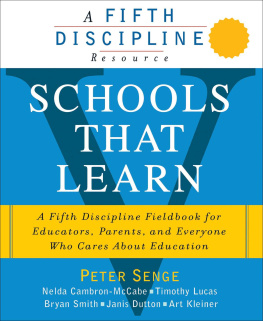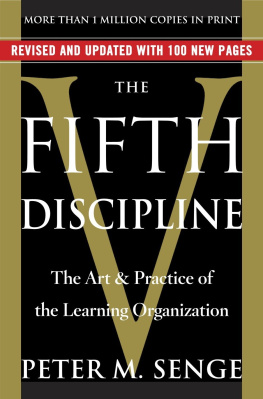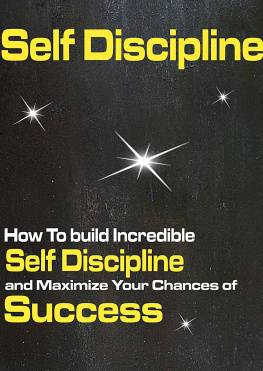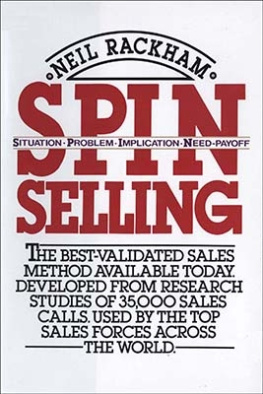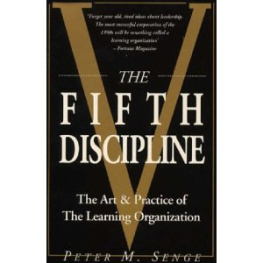Peter M. Senge - The Fifth Discipline Fieldbook: Strategies for Building a Learning Organization
Here you can read online Peter M. Senge - The Fifth Discipline Fieldbook: Strategies for Building a Learning Organization full text of the book (entire story) in english for free. Download pdf and epub, get meaning, cover and reviews about this ebook. year: 1994, publisher: Nicholas Brealey Publishing, genre: Business. Description of the work, (preface) as well as reviews are available. Best literature library LitArk.com created for fans of good reading and offers a wide selection of genres:
Romance novel
Science fiction
Adventure
Detective
Science
History
Home and family
Prose
Art
Politics
Computer
Non-fiction
Religion
Business
Children
Humor
Choose a favorite category and find really read worthwhile books. Enjoy immersion in the world of imagination, feel the emotions of the characters or learn something new for yourself, make an fascinating discovery.

- Book:The Fifth Discipline Fieldbook: Strategies for Building a Learning Organization
- Author:
- Publisher:Nicholas Brealey Publishing
- Genre:
- Year:1994
- Rating:5 / 5
- Favourites:Add to favourites
- Your mark:
- 100
- 1
- 2
- 3
- 4
- 5
The Fifth Discipline Fieldbook: Strategies for Building a Learning Organization: summary, description and annotation
We offer to read an annotation, description, summary or preface (depends on what the author of the book "The Fifth Discipline Fieldbook: Strategies for Building a Learning Organization" wrote himself). If you haven't found the necessary information about the book — write in the comments, we will try to find it.
The Fifth Discipline Fieldbook: Strategies for Building a Learning Organization — read online for free the complete book (whole text) full work
Below is the text of the book, divided by pages. System saving the place of the last page read, allows you to conveniently read the book "The Fifth Discipline Fieldbook: Strategies for Building a Learning Organization" online for free, without having to search again every time where you left off. Put a bookmark, and you can go to the page where you finished reading at any time.
Font size:
Interval:
Bookmark:
PETER M. SENGE
ART KLEINER
CHARLOTTE ROBERTS
RICHARD B. ROSS
BRYAN J. SMITH

The Fifth Discipline Fieldbook
Strategies and Tools for Building a Learning Organization
First published in Great Britain by
Nicholas Brealey Publishing in 1994
3-5 Spafield Street, Clerkenwell
London EC1R 4QB
www.nicholasbrealey.com
Reprinted 1994, 1995 (twice, with corrections), 1996, 1997, 1998, 1999, 2000, 2001, 2002, 2003, 2005, 2007, 2009, 2010
Copyright 1994 by Peter M. Senge, Charlotte Roberts, Richard B. Ross, Bryan J. Smith, Art Kleiner
The rights of Peter M. Senge, Charlotte Roberts, Richard B. Ross, Bryan J. Smith, Art Kleiner to be identified as author of this work has been asserted by them in accordance with the Copyright. Designs and Patents Act 1988.
ISBN 978-1-85788-060-1
British Library Cataloguing in Publication Data
A catalogue record for this book available from the British Library
All rights reserved. No part of this publication may be reproduced, stored in a retrieval system, or transmitted, in any form or by any means, electronic, mechanical, photocopying, recording and/or otherwise without the prior written permission of the publishers. This book may not be lent, resold, hired out or otherwise disposed of by way of trade in any form, binding or cover other than that in which it is published, without the prior consent of the publishers.
Printed in India by Gopsons Papers Ltd., Noida
Peter Senge
Like my previous book, The Fifth Discipline, this fieldbook describes the experimentation, research, writing, and invention of hundreds of people. My colleagues in the organizations with which I am associatedthe Center for Organizational Learning at MITs Sloan School of Management, where I am director; the consulting and training firm Innovation Associates, where I continue to conduct Leadership and Mastery workshops; and the Learning Circle, a new organization founded to develop the worldwide community of learning organization practitionersand I have come to know, and often participate in, many new stories of change. More than ever we are coming to believe that a new type of management practitioner is emerging today, a person who is willing to combine his or her own personal learning with broader collective action in an organization.
As we have met more and more people who fit this description, we realized the potential value of a bookor a series of bookssharing the learnings emerging in this growing community. Alone I would have been unable to realize this vision, in part because of the demands of my commitments in building the MIT Learning Center. Fortunately, a group of longtime collaborators shared the vision of the Fieldbook. Each had been involved in implementing or communicating about learning-organization principles and methods for ten years or longer. It was delightful to watch how we quickly became a coherent team, with each of us bringing his or her distinctive sensibility to the project.
The team of authors of the Fieldbook includes:
 Charlotte Robertsa speaker, consultant, program designer, and writer whose work has focused on the executive teams role in a learning organization. Charlotte and I have probably co-led more Leadership and Mastery workshops than any other teamit often seems like for much of our adult lives. She is a principal at Innovation Associates, where she codirects their quality-leadership practice. She has worked with a wide range of organizations, from manufacturing to hardware and software design to healthcare to local community groups. Her column Managing People ran for three years in the Great Valley News in the Philadelphia area. Based in Sherrills Ford, North Carolina, Charlotte brings a unique blend of Southern charm and style to the challenging work of organization changeand she possesses an engaging storytellers wit, as a few thousand graduates of Leadership and Mastery workshops can attest.
Charlotte Robertsa speaker, consultant, program designer, and writer whose work has focused on the executive teams role in a learning organization. Charlotte and I have probably co-led more Leadership and Mastery workshops than any other teamit often seems like for much of our adult lives. She is a principal at Innovation Associates, where she codirects their quality-leadership practice. She has worked with a wide range of organizations, from manufacturing to hardware and software design to healthcare to local community groups. Her column Managing People ran for three years in the Great Valley News in the Philadelphia area. Based in Sherrills Ford, North Carolina, Charlotte brings a unique blend of Southern charm and style to the challenging work of organization changeand she possesses an engaging storytellers wit, as a few thousand graduates of Leadership and Mastery workshops can attest.
 Richard (Rick) Ross and I have worked together for ten years, engaging in regular dialogue about the nature of learning in organizations for most of that time. He is the most vocal champion among us for the practical managers needs and concerns. He began his career as a neuroscientist, investigating where in the brain different types of learning occur. He went on to become a clinical psychologist, a practicing manager, and finally an organizational consultant. He has worked extensively with major corporations, focusing increasingly on the design and delivery of programs for intact teams, and on methods for implementing the learning disciplines. We sometimes think that all of this is merely preparation for his real callingbeing a stand-up comic. Rick has served on the faculty of the University of Southern California and is currently the president of Ross Partners. He lives in San Diego, California.
Richard (Rick) Ross and I have worked together for ten years, engaging in regular dialogue about the nature of learning in organizations for most of that time. He is the most vocal champion among us for the practical managers needs and concerns. He began his career as a neuroscientist, investigating where in the brain different types of learning occur. He went on to become a clinical psychologist, a practicing manager, and finally an organizational consultant. He has worked extensively with major corporations, focusing increasingly on the design and delivery of programs for intact teams, and on methods for implementing the learning disciplines. We sometimes think that all of this is merely preparation for his real callingbeing a stand-up comic. Rick has served on the faculty of the University of Southern California and is currently the president of Ross Partners. He lives in San Diego, California.
 Bryan Smith is president of Innovation Associates of Canada. He lives in Thornhill, Ontario. He and I have been good friends for almost fifteen years. A central focus of his work involves helping organizations become healthy, vibrant communities of common purpose, by applying the learning disciplines to strategic planning, team development, and organizational change. Bryan began his study of visionary leadership in his doctoral work seventeen years ago, and he is extraordinarily insightful into the dilemmas and strategies of effective leadership. He is without doubt one of the most thoughtful and experienced consultants in this field. In this project he took on the unofficial role of team diplomat.
Bryan Smith is president of Innovation Associates of Canada. He lives in Thornhill, Ontario. He and I have been good friends for almost fifteen years. A central focus of his work involves helping organizations become healthy, vibrant communities of common purpose, by applying the learning disciplines to strategic planning, team development, and organizational change. Bryan began his study of visionary leadership in his doctoral work seventeen years ago, and he is extraordinarily insightful into the dilemmas and strategies of effective leadership. He is without doubt one of the most thoughtful and experienced consultants in this field. In this project he took on the unofficial role of team diplomat.
 Art Kleiner has been a professional writer since 1985. He is a contributing editor of the Whole Earth Review and Garbage Magazine, a faculty member at New York Universitys Interactive Telecommunications Program, and a consulting editor at MITs Center for Organizational Learning. His book, The Age of Heretics (in progress for Currency Doubleday), is a history of the social movement of people trying to change large corporations for the better between 1970 and 1990. The Fifth Discipline never would have turned out as it did without Arts help. He is, in my experience, a unique combination of writer, editor, and coachwith a genuine commitment to helping people find their own voice. If he ever gets bored with writing, hed be a great consultant. It is very nice that he can come out from behind the curtain for the Fieldbook, for which he serves as editorial director.
Art Kleiner has been a professional writer since 1985. He is a contributing editor of the Whole Earth Review and Garbage Magazine, a faculty member at New York Universitys Interactive Telecommunications Program, and a consulting editor at MITs Center for Organizational Learning. His book, The Age of Heretics (in progress for Currency Doubleday), is a history of the social movement of people trying to change large corporations for the better between 1970 and 1990. The Fifth Discipline never would have turned out as it did without Arts help. He is, in my experience, a unique combination of writer, editor, and coachwith a genuine commitment to helping people find their own voice. If he ever gets bored with writing, hed be a great consultant. It is very nice that he can come out from behind the curtain for the Fieldbook, for which he serves as editorial director.
In addition, we have all drawn heavily upon contributions from many, many other peoplecolleagues from whom we have learned much, and contributors whose writing appears directly in this volume. A list of acknowledgments appears on page 567.
Among the tribes of northern Natal in South Africa, the most common greeting, equivalent to hello in English, is the expression: Sawu bona. It literally means, I see you. If you are a member of the tribe, you might reply by saying Sikhona, I am here. The order of the exchange is important: until you see me, I do not exist. Its as if, when you see me, you bring me into existence.
Font size:
Interval:
Bookmark:
Similar books «The Fifth Discipline Fieldbook: Strategies for Building a Learning Organization»
Look at similar books to The Fifth Discipline Fieldbook: Strategies for Building a Learning Organization. We have selected literature similar in name and meaning in the hope of providing readers with more options to find new, interesting, not yet read works.
Discussion, reviews of the book The Fifth Discipline Fieldbook: Strategies for Building a Learning Organization and just readers' own opinions. Leave your comments, write what you think about the work, its meaning or the main characters. Specify what exactly you liked and what you didn't like, and why you think so.

